New roof? Do you know what "roofers" do but not why you need one? Stop looking. This article will explain roofers and how they can make your home safer.
Roofers install and repair roofs professionally. They can handle any terrain and weather. They can easily install a new roof and identify potential issues before they become problems, saving you time and money.
These technicians also innovate. They can recommend materials that meet your needs and offer creative solutions that save money while still protecting against the elements. If you want peace of mind and savings when fixing your roof, choose a reputable roofer. In this article, you will know what is a roofer and the services they could offer.
You've seen them around town—brave souls on ladders working on your neighbour's roof. Roofers are physically demanding construction workers. Residential and commercial roofers install and repair roofs.
Experienced roofers know about shingles, tiles, metal sheets, and more. They must also know how to install materials based on the building's structure and environment. To avoid accidents, these professionals must also know weatherization and safety procedures.
Due to its physical demands, roofing requires technical skills to install flashings and gutter systems. With so many tasks, this career path can be lucrative if done right. Now that we know what a roofer does, let's examine the qualifications and skills needed to succeed.
Roofers need certain skills and qualifications to succeed. First, this field experience is essential. They should demonstrate knowledge of roofing materials and installation methods to prospective employers. Projects benefit from knowledge of roof building codes and safety regulations.
Roofers must stay fit to perform their duties. Lifting heavy objects or climbing ladders to carry materials onto roofs are strength training exercises. Cutting shingles and other materials may require basic carpentry skills.
Finally, most roofers must communicate with team members and supervisors throughout their projects. To complete tasks smoothly, they must clearly communicate their plans and concerns. Roofers can start their careers with these qualifications and skills. Next, let's look at professional roofing projects.
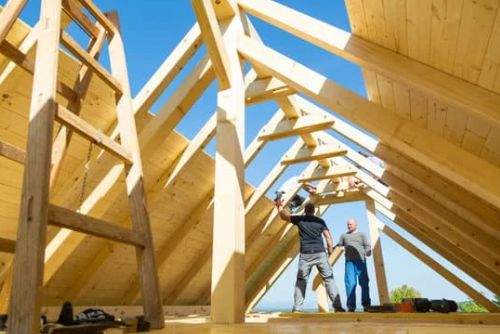
Roofers repair and install residential and commercial roofs. They build, maintain, and repair roofs.
There are a variety of projects that a roofer may be involved in such as:
Roofers must be meticulous. To avoid issues later, they must properly install everything during construction. They must identify weak spots and replace them when repairing. Before further deterioration occurs, weather- or age-damaged roof areas must be repaired.
Some jobs require climbing steep rooftops, while others require minimal physical activity indoors. Always prioritise safety. Roofers must always have the right tools and safety gear, including harnesses and helmets, to work safely. These precautions allow everyone to work safely and successfully. As we move on to "working conditions," let's discuss roofers' potential hazards.
Roofers have many daily tasks. You may need to install or repair shingles, tiles, metal, or rubber roofs. Roofers must also accurately measure and seal off areas before working. They must also determine what repairs or installations each job requires and prepare ladders and scaffolding for rooftop access.
Since you work in tight spaces with heavy equipment, roofing jobs require strength, stamina, and agility. Working outside in all weather is common. When you work inside, knowledge of wiring and plumbing may be useful.
However, the satisfaction of a well-built roof makes being a roofer worth it. Roofers can succeed with ambition and skill. Roofer safety is next.
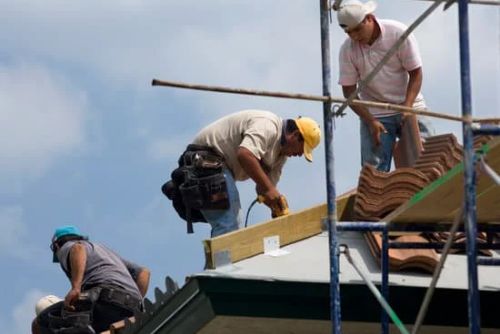
Roofers prioritize safety. It's essential to take extra precautions when working on a roof and be aware of any potential hazards around you. To ensure your own safety as well as that of others around you, here are some important tips for roofing safely:
Roof work requires proper equipment and safety gear. Hard hats, gloves, eye protection, non-slip shoes, harnesses, lanyards, and other PPE are required. Make sure all tools and materials being used are in good condition before beginning work.
Second, secure the scaffolding if you're doing extensive roof work. Make sure it meets local standards if there aren't any. Always use guard rails or toe boards when scaffolding. No matter how fit you are, never lift anything over your head without help.
Remember these tips to complete every task safely and efficiently. This knowledge gives us peace of mind, allowing us to focus on what matters most: high-quality roof work in an innovative way that exceeds customer expectations. Let's examine some roofing benefits...
Roofers benefit. It's necessary and always in demand. Roofers must repair homes, businesses, factories, and more. If you can install new roofs or repair old buildings, you can advance.
Roofers protect homes and businesses from severe weather and rodents. You'll be proud to know that your efforts are preserving these vital structures.
Roofing pays well with good benefits. Many companies reward exceptional workers with bonuses and other incentives. At larger corporations with multiple locations needing skilled professionals like you, you can travel and earn more.
Professional roofers have unique benefits, from career growth to the satisfaction of protecting others. Let's see how avoiding common mistakes can help projects succeed.
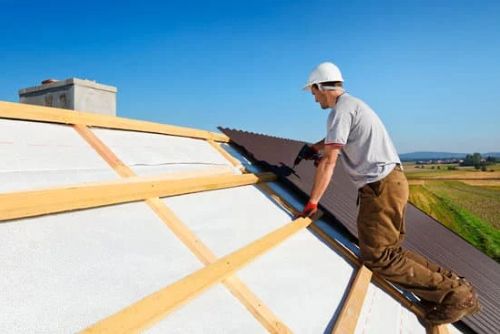
Roofing mistakes are common. As a homeowner, knowing these mistakes and how to avoid them is crucial to project success. Here are the most important things to consider when hiring a professional roofer:
First, working with different roof systems is complicated. Choose a qualified contractor who knows which materials will work best for your home and can install them properly. This includes proper flashing around chimneys and vents and shingle installation for longevity.
Second, check contractors' local building code experience. Local regulations may affect materials or require permits. Before starting, qualified roofers should know how to comply with local laws.
Before hiring a roofer, inquire about warranties and other guarantees. If something goes wrong, make sure their promises are in a contract. This precaution lets you rest easy knowing everything was done according to plan—no matter what. With these tips, you're ready to learn about roofer costs.
What is a roofer and how much does their services cost? Roofers cost differently. The size, complexity, and materials used in your project determine the cost of their services. Roofers earn $80 to $150 per hour working on existing roofs and $500 or more installing new ones. This could quickly add up depending on how long they take to finish.
Make sure contractors include labor costs and any special materials or permit fees in their estimates. Ask about warranties—some companies cover future damage from poor workmanship or weather. Ask about clean-up fees and the removal of old shingles and debris after completion. Before signing a contract, you'll know what you're paying for.
Planning home improvement projects, especially expensive ones like reroofing, requires accurate information. However, quality resources will help you find professional roofers who deliver high-quality results at affordable prices.

Finding a reliable, experienced roofer can be difficult. Fortunately, there are many online resources to get you started. Indeed, Glassdoor lists many national and local roofer jobs. These positions may require experience and specific certifications or licenses. Before applying, check out larger roofing contractors' websites for job listings.
Networking also helps find skilled roofers. Ask family, friends, neighbors, and coworkers—anyone who recently had work done—for recommendations. Word-of-mouth referrals provide information about candidates and a company's customer service and satisfaction.
After using these tools to narrow your search, interview each candidate and ask lots of questions to make sure they meet your needs. Consider cost estimates and contractor guarantees, along with experience and insurance. This ensures you hire the right candidate. Find a qualified roofer quickly with the right resources.
As a homeowner, you should understand roofer licensing. This ensures you hire a skilled roofer who can do the job right. Ask prospective roofers about their qualifications and experience. Ask if they have all local and state licenses for your project.
The contractor's certifications may indicate higher expertise than general licensure. Check the roofer's liability insurance to protect yourself from home repairs. Before starting work, discuss payment terms to avoid confusion.
Researching a reputable roofer is crucial. When hiring someone for such an important task, asking pertinent questions about license requirements, certification status, experience level, and more is crucial. With these steps completed in advance, you'll feel confident that you chose the best professional roofer for your needs.
Choosing a roofer can be difficult. With so many options, you need to know what to look for in a professional roofer and how to verify their qualifications. Roofers learn a variety of skills to safely and efficiently complete roofing jobs, so make sure your contractor has enough training and experience with the materials needed for your job.
Verify their credentials. Make sure they have state and local government licenses and NRCA certifications. This will show that the contractor knows how to install asphalt shingles, metal, slate, and other roofs. Ask about liability insurance. Workers at your home or business must be insured in case of an accident or damage.
Before signing any contracts, ask about their past work and go over every detail. Get references from previous customers to see how well this contractor works. You can be sure you picked the right roofer by considering all these factors.
Roofers' training depends on their skill level and job site materials. To complete a roofing installation or repair project, you must know what courses are needed.
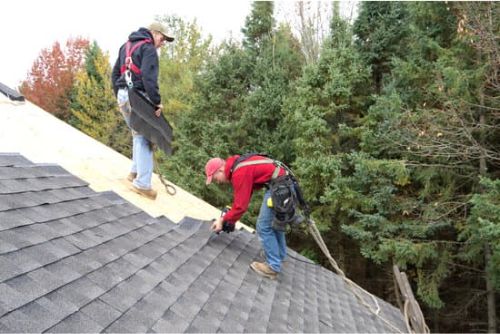
There are great training programs for roofers. These courses can teach you everything from basic installation to complex repairs, depending on your experience and interests. Here's what you need to know:
Starting a career in roofing requires a solid education. With good training, you can handle any project. Professional roofers' equipment is next.
After discussing roofer training programs, let's examine their equipment. Roof construction requires specialised tools. While installing metal roofs, metal roofers use roll-forming machines to make multiple metal pieces from one sheet. Magnetic drills make screw installation easy and accurate.
They also need ladders, scaffolding, hammer guns, pneumatic nail guns, grinders, and more to work efficiently. Depending on the material installed, angle cutters or crimpers may be needed. Professional roofers need high-quality, reliable tools to work efficiently.
Professionals also need safety gear. Experienced roofers wear hard hats, safety glasses, ear plugs, and gloves before work. These items should be worn during installation projects regardless of the season or climate. After discussing professional roofers' equipment, let's discuss roof maintenance best practices.
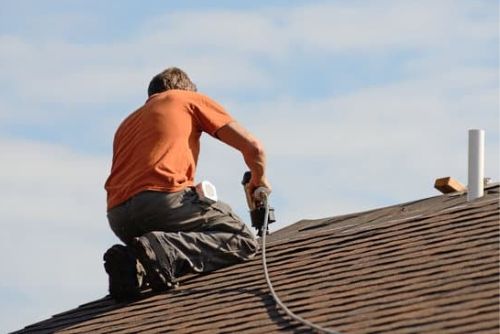
Maintaining your roof is crucial to its health. Best practices can prevent roof deterioration. First and foremost, professional roofer inspections are necessary. This will detect issues before they become costly repairs or replacements. Doing this annually can save you time and money.
Maintaining shingles and flashing is another roof maintenance tip. Replace these if they break. Metal roofs require less maintenance than asphalt shingle roofs. A roofer can help you choose the right roof for your home and climate.
Debris can accumulate around your roof's edges and cause damage if not removed regularly. Clogged gutters can cause roof water to pool instead of draining. You'll feel secure knowing your roof is well maintained.
Before hiring a roofer, consider experience, insurance, pricing, guarantees, materials, and more.
Now that you know how to maintain your roof, it's important to think about hiring a professional roofer. Before starting work, these factors should be carefully considered. Here are five key items to think about:
Research before choosing a roofer. Quality work takes time, so find someone who understands your roof installation goals and can deliver within your budget. Trust your gut—if something doesn't feel right, move on until you're comfortable.
Finally, roofers are experts who do more than just lay shingles. They must know many materials and techniques, have specialised tools, and know how to work safely on roofs.
Roofers' salaries vary by experience, location, and project. Residential projects are faster than commercial ones but require more expertise. Roofers must also comply with insurance requirements to protect themselves and their clients.
Understanding what it takes to be a roofer can help you appreciate what goes into keeping our homes safe. Skill, knowledge, dedication, and hard work keep us under strong roofs made of durable materials. By now, you already know what is a roofer and the work that they do.
Roofers have one of the most rewarding careers. People want to know the average roofer's salary because this job pays well and has great benefits. Let's examine roofers' earnings to answer that.
Becoming a roofer is great because you can start making money right away without any experience. The average salary ranges from $27,000 to $60,000, depending on location, skill, and experience. Depending on their work, experienced roofers may make more. It's also worth noting that some areas offer overtime pay, which can boost earnings.
Success in this field takes time. Learning a trade takes time and practice. Many employers offer apprenticeships or training programmes for those seeking higher-paying jobs. Due to their knowledge of residential and commercial building construction materials and methods, experienced professionals often get higher-paying contracts.
Thus, becoming a roofer has huge earning potential if you're willing to work hard. Now is the time to pursue this lucrative career.
Residential and commercial roofing projects exist. Residential roofing is for single-family homes or small apartments—the typical house you see driving around town. Commercial roofing involves office buildings, warehouses, and shopping centers.
Both require different skills to complete the job. Residential roofers must work with asphalt shingles, metal roofs, and rubber membrane systems. They must also know residential construction codes. Commercial roofers install insulation, waterproof membranes, skylights, and gutters.
Each project has different requirements, so professional fees vary. Since commercial jobs require more materials and specialised equipment, residential jobs are usually cheaper. Before choosing, consider these factors to get the best value and quality results.
The length of a roofing project depends on its complexity. Before beginning work, a professional roofer will consider the structure's type, materials, and size.
An experienced contractor can finish a residential roofing project in days. Most homes have simple designs that don't require as much customization or labour as larger projects. Commercial buildings are more complicated and require more materials, so installation takes longer.
A reputable roofer will also consider any additional repairs and weather conditions like rain or snowfall when estimating project completion time. Hiring a skilled roofer who understands all these factors ensures your project is completed quickly and well.
Choosing a roof material involves many factors. Choose a durable, weatherproof, and attractive option. Let's look at some popular roofing materials to help you decide.
Due to their affordability and ease of installation, asphalt shingles are a popular residential roofing material. Homeowners can customize their roof design with the many colours and textures available. Asphalt shingles need replacing every 10–15 years.
Metal roofing is durable and low-maintenance. Steel and aluminum metal roofs have different costs and performance benefits. Metal roofs also reflect heat, keeping your home cooler in the summer.
Tile roofing is another unique alternative to asphalt shingles and metal roofing. Since ancient times, tile roofing has come in many forms, from terracotta to slate. Tile is heavy, but it insulates well in milder climates.
Before choosing a roof material, research thoroughly. This will help you and your contractor understand the job.
Roofers need proper insurance. This protects them from injury and gives homeowners peace of mind knowing that their contractor has taken all necessary precautions before starting a job.
Here are some key things that roofers should consider when looking into proper insurance coverage:
It's hard to find the right insurance. It requires studying policies and their benefits. Start by talking to other roofers who understand the risks and can recommend reliable insurers with competitive rates. Local business associations often offer workshops and seminars to help you choose the right policy.
As a professional, you must protect yourself legally and show your customers that you care enough about quality work to do it safely and efficiently to insure yourself and your projects.